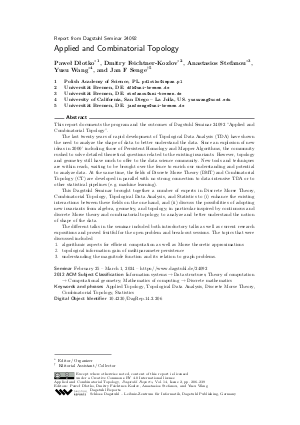Applied and Combinatorial Topology (Dagstuhl Seminar 24092)
Authors Paweł Dłotko, Dmitry Feichtner-Kozlov, Anastasios Stefanou, Yusu Wang, Jan F Senge and all authors of the abstracts in this report
-
Part of:
Issue:
Dagstuhl Reports, Volume 14, Issue 2
Part of: Volume: Dagstuhl Reports, Volume 14
Part of: Journal: Dagstuhl Reports (DagRep) - License:
 Creative Commons Attribution 4.0 International license
Creative Commons Attribution 4.0 International license
- Publication Date: 2024-07-30
File

PDF
DagRep.14.2.206.pdf
- Filesize: 3.18 MB
- 34 pages
Document Identifiers
Subject Classification
ACM Subject Classification
- Theory of computation → Computational geometry
- Mathematics of computing → Discrete mathematics
- Information systems → Data structures
Keywords
- Applied Topology
- Topological Data Analysis
- Discrete Morse Theory
- Combinatorial Topology
- Statistics
Metrics
- Access Statistics
-
Total Accesses (updated on a weekly basis)
0PDF Downloads0Metadata Views
Abstract
This report documents the program and the outcomes of Dagstuhl Seminar 24092 "Applied and Combinatorial Topology". The last twenty years of rapid development of Topological Data Analysis (TDA) have shown the need to analyze the shape of data to better understand the data. Since an explosion of new ideas in 2000’ including those of Persistent Homology and Mapper Algorithms, the community rushed to solve detailed theoretical questions related to the existing invariants. However, topology and geometry still have much to offer to the data science community. New tools and techniques are within reach, waiting to be brought over the fence to enrich our understanding and potential to analyze data. At the same time, the fields of Discrete Morse Theory (DMT) and Combinatorial Topology (CT) are developed in parallel with no strong connection to data-intensive TDA or to other statistical pipelines (e.g. machine learning). This Dagstuhl Seminar brought together a number of experts in Discrete Morse Theory, Combinatorial Topology, Topological Data Analysis, and Statistics to (i) enhance the existing interactions between these fields on the one hand, and (ii) discuss the possibilities of adopting new invariants from algebra, geometry, and topology; in particular inspired by continuous and discrete Morse theory and combinatorial topology; to analyze and better understand the notion of shape of the data. The different talks in the seminar included both introductory talks as well as current research expositions and proved fruitful for the open problem and break-out sessions. The topics that were discussed included 1) algorithmic aspects for efficient computation as well as Morse theoretic approximations 2) topological information gain of multiparameter persistence 3) understanding the magnitude function and its relation to graph problems.
Cite As Get BibTex
Paweł Dłotko, Dmitry Feichtner-Kozlov, Anastasios Stefanou, Yusu Wang, and Jan F Senge. Applied and Combinatorial Topology (Dagstuhl Seminar 24092). In Dagstuhl Reports, Volume 14, Issue 2, pp. 206-239, Schloss Dagstuhl – Leibniz-Zentrum für Informatik (2024)
https://doi.org/10.4230/DagRep.14.2.206
BibTex
@Article{dlotko_et_al:DagRep.14.2.206,
author = {D{\l}otko, Pawe{\l} and Feichtner-Kozlov, Dmitry and Stefanou, Anastasios and Wang, Yusu and Senge, Jan F},
title = {{Applied and Combinatorial Topology (Dagstuhl Seminar 24092)}},
pages = {206--239},
journal = {Dagstuhl Reports},
ISSN = {2192-5283},
year = {2024},
volume = {14},
number = {2},
editor = {D{\l}otko, Pawe{\l} and Feichtner-Kozlov, Dmitry and Stefanou, Anastasios and Wang, Yusu and Senge, Jan F},
publisher = {Schloss Dagstuhl -- Leibniz-Zentrum f{\"u}r Informatik},
address = {Dagstuhl, Germany},
URL = {https://drops.dagstuhl.de/entities/document/10.4230/DagRep.14.2.206},
URN = {urn:nbn:de:0030-drops-205059},
doi = {10.4230/DagRep.14.2.206},
annote = {Keywords: Applied Topology, Topological Data Analysis, Discrete Morse Theory, Combinatorial Topology, Statistics}
}
